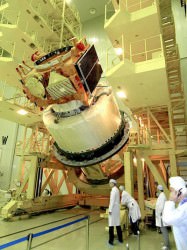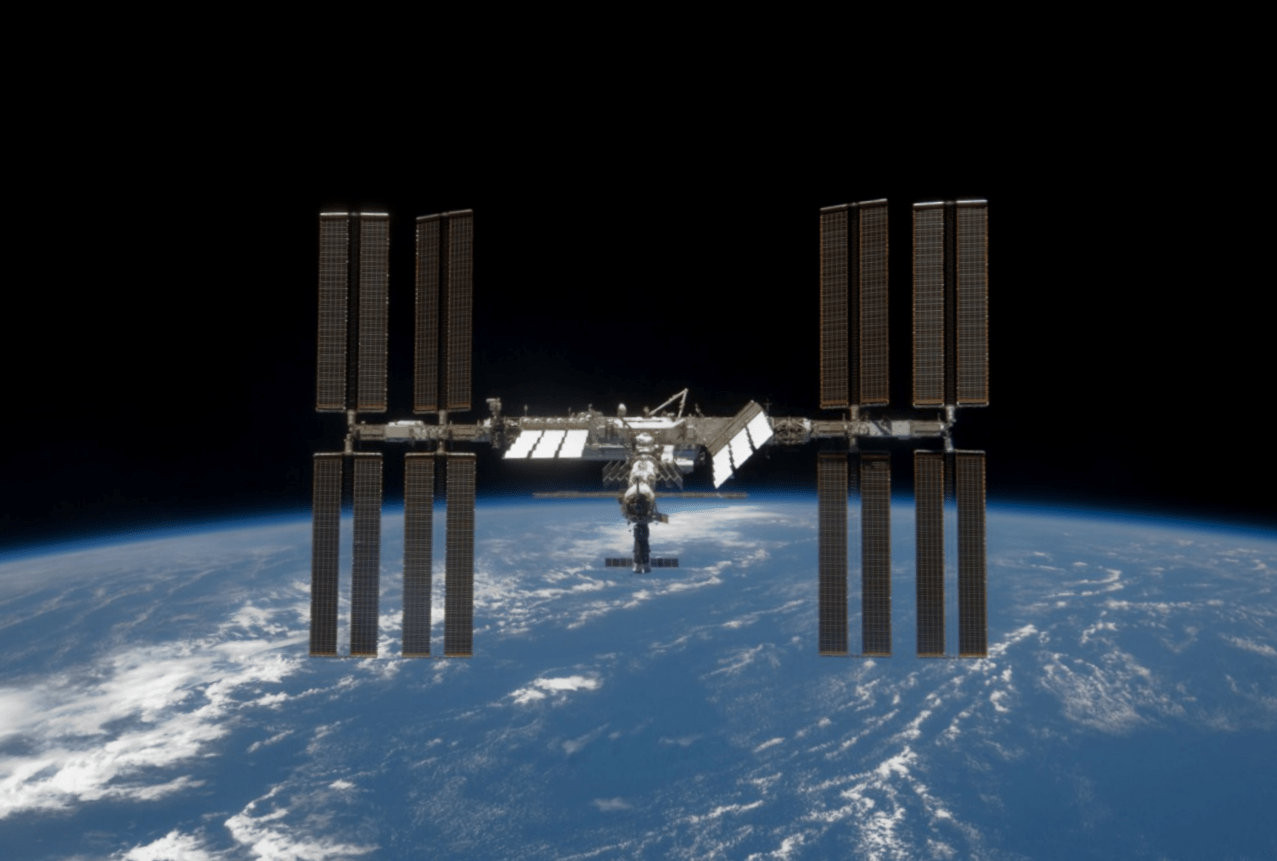The International Space Station will have to look out for new debris from an exploded Russian rocket (NASA image)
Traveling through low-Earth orbit just got a little more dangerous; a drifting Russian Breeze M (Briz-M) rocket stage that failed to execute its final burns back on August 6 has recently exploded, sending hundreds of shattered fragments out into orbit.
Russia and the U.S. Defense Department (JFCC-Space) have stated that they are currently tracking 500 pieces of debris from the disintegrated Breeze M, although some sources are saying there are likely much more than that.
 After a successful liftoff via Proton rocket on August 6 from the Baikonur Cosmodrome, the Breeze M upper stage’s engines shut off after only 7 seconds as opposed to the normal 18 minutes, leaving its fuel tanks filled with 10 to 15 tons of hydrazine and nitrogen tetroxide propellants. Its payloads, the Indonesian Telkom 3 and the Russian Express-MD2 communications satellites, were subsequently deployed into the wrong orbits as the Breeze M computer continued functioning.
After a successful liftoff via Proton rocket on August 6 from the Baikonur Cosmodrome, the Breeze M upper stage’s engines shut off after only 7 seconds as opposed to the normal 18 minutes, leaving its fuel tanks filled with 10 to 15 tons of hydrazine and nitrogen tetroxide propellants. Its payloads, the Indonesian Telkom 3 and the Russian Express-MD2 communications satellites, were subsequently deployed into the wrong orbits as the Breeze M computer continued functioning.
Although originally expected to remain intact for at least another year, the rocket stage “violently disintegrated” on October 16. Evidence of the explosion was first observed by astronomer Robert McNaught at Australia’s Siding Springs Observatory, who counted 70 fragments visible within the narrow field-of-view telescope he was using for near-Earth asteroid observations.
The exact cause of the explosion isn’t known — it may have been sparked by an impact with another piece of space junk or the result of stresses caused by the Breeze M’s eccentric orbit, which varied in altitude from 265 to 5,015 kilometers (165 miles to 3,118 miles) with an inclination of 49.9 degrees.
This was the third such breakup of a partially-full Breeze M upper stage in orbit, the previous events having occurred in 2007 and 2010, and yet another Breeze M still remains in orbit after a failed burn in August 2011.
Most of the latest fragments are still in orbit at altitudes ranging from 250 to 5,000 km (155 to 3,100 miles), where they are expected to remain.
“Although some of the pieces have begun to re-enter, most of the debris will remain in orbit for an extended period of time.”
– Jamie Mannina, US State Department spokesperson
According to NASA the debris currently poses no immediate threat to the Space Station although the cloud is “believed not to be insignificant.” Still, according to a post on Zarya.com the Station’s course will periodically take it within the Breeze M debris cloud, and “will sometimes spend several days at a time with a large part of its orbit within the cloud.”
Source: RT.com and SpaceflightNow.com. Inset image: the Breeze M (Briz-M) upper stage which disintegrated on Oct. 16. (Khrunichev)


One more reason to get a tow- or garbage-truck type module up there.
Soon we can blame any in-space failure to space debris. Whether there was a tracked particle or not.
Will @SJStar attempt to explain that this failure can be considered more of a success than the recent SpaceX engine failure? I await with baited breath…
I guess SJStar chooses to ignore the threat posed by debris from Briz or COSMOS hardware (or Mars 2, 3, 6, 7 dumped on Mars) but bemoans a piece of plastic that fell off the Curiosity lander.
Ditto. If you cannot make sure your spacecraft are 110% sterile and are unable to stop ANY material to be shredded when constructed [and launched], you shouldn’t be venturing beyond the Earth.
Shoddy or short-cut practices should be attacked at every opportunity — Russian, American, Chinese, or anyone else! (I’ve never said otherwise!)
You contradict yourself…
http://www.universetoday.com/97798/shiny-object-on-mars-update-likely-benign-plastic/#comment-679010644
I take circumstances as I see them. Americans, for example, stuff up, I’ll point that out.
Good to see the champing-at-the-bit when someone else makes a mistake… Typical. We dump the responsibility when we make the mistake, then call out blue-murder when someone else does it — used only to justify their own irresponsibility.
BTW . Ever thought that half-a-day away might take more time to reply…
You guys just haven’t got what I’ve said. The point is that corporations should not be launching rockets and instead should be controlled by countries – mostly as they are ultimately not signatories to international agreements. This is simply because, under the inherent American capitalist system, for example, companies are subject to the laws of the countries they trade in. If they make a mistake all you can do is fine or sue them for damages. You only have to look at the results of the Gulf of Mexico disaster by the Shell company or the Californian Pacific Gas and Electric fourteen year-long water contamination by hexavalent chromium.
Secondly, the Russian accident here is as mind-numming stupid as Space X’s or the Chinese blowing up satellites in orbit. All accidents in LEO should be condemned as criminal acts against humanity.
Why? LEO is a precious resource for the modern world, including climate monitoring, weather, communications, crop management, research, etc. One stupid mistake with something like the ISS, and LEO could be unusable for many decades to centuries. The damage to the modern world could be utterly devastating, leading to a sharp decline in civilisation or even as far as the eradication of us as a species. In a world with dwindling resources it is paramount that countries dump their narrow self-interests and do work in outer space for the benefit of all humanity.
[Even worse is the fear that some rouge nation could make a terrorist act by deliberately destroying satellites are exploding then in LEO for strategic military advantage.]
The arrogance and failure of some Americans not taking this seriously is just truly breathtaking!
Great. Someone asks you for your opinion, and immediately we see that the dipstick anonymous jerks just dock you for it. Next time, I promise to be just as unforgiving. :{
call me an idiot, but I seem to be missing some kind of error from space X that would be considered anything other than insignificant? I’ve clearly missed something, link?
You are an idiot!
Finally! I can agree with you on something. This particular Russian system has failed four times in 18 launches. We’re talking catastrophic failures in which no mission was accomplished – primary or secondary – and debris was left in orbit. That is unacceptable.
SpaceX had a malfunction yet the design was robust enough to complete the primary mission and allow a small amount of science on the secondary. I haven’t noticed a report on the track of the debris to understand if it left the atmosphere, how long it remained aloft and what threat it posed to existing missions. Since the ORBCOMM satellite quickly deorbited, I suspect the debris did as well.
The facts at this time do not support your opinion that only governments should be involved in launching and exploring space. You could very well be correct in the long run but I am unconvinced.
“All accidents in LEO should be condemned as criminal acts against humanity.” and “If you cannot make sure your spacecraft are 110% sterile and are unable to stop ANY material to be shredded when constructed [and launched], you shouldn’t be venturing beyond the Earth.”
Statements like this are useless and stupid. Perfection is, and always will be, impossible. If we punish every accident as a criminal act against humanity, LEO will quickly become an unused resource and the decline you fear will be a certainty.
Let’s take this discussion in a positive direction. What are the leading concepts to getting our nearby space environment cleaned up? I’ve heard about a couple of things but they didn’t seem practical.
Fair enough. Many of your points are valid.
The space station needs phasers.